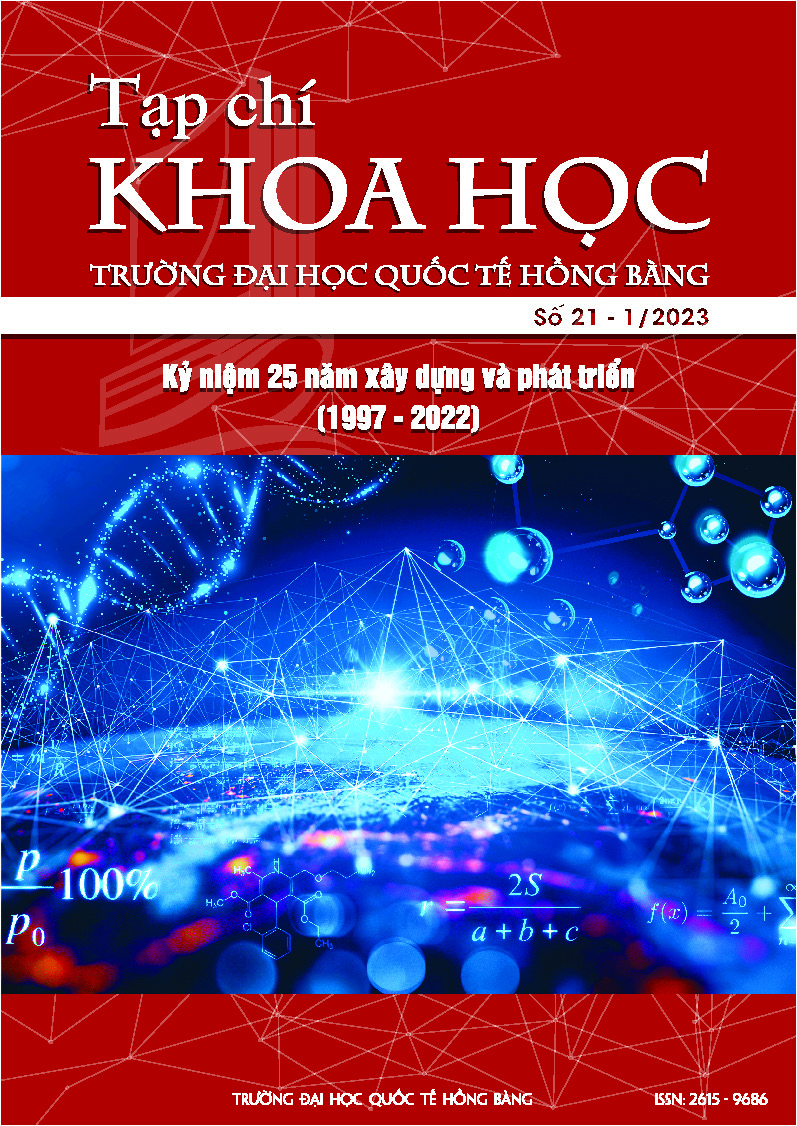Mối quan hệ giữa học tập trải nghiệm, kỹ năng đáp ứng công việc với sự hài lòng của sinh viên ngành Quản lý khách sạn tại Thành phố Hồ Chí Minh
Các tác giả
DOI: https://doi.org/10.59294/HIUJS.21.2023.35Từ khóa:
học tập trải nghiệm, kỹ năng đáp ứng công việc, hài lòng trong học tậpTóm tắt
Một trong những điểm yếu lớn nhất của nhân lực lao động trong ngành du lịch Việt Nam hiện nay là thiếu và yếu kỹ năng đáp ứng công việc. Chính vì thế, nghiên cứu này được thực hiện nhằm tìm hiểu giữa học tập trải nghiệm, kỹ năng đáp ứng công việc với sự hài lòng của sinh viên ngành Quản lý khách sạn hệ Trung cấp tại Thành phố Hồ Chí Minh. Khảo sát được thực hiện từ 06-07/2022 bằng phương pháp phi xác suất lấy mẫu thuận tiện. Kết quả các bảng khảo sát được thu về thông qua phần mềm google form với 348 bảng câu hỏi phù hợp với đề tài nghiên cứu và sử dụng phần mềm SPSS 25.0, phần mềm Smart PLS 3.0 để xử lý dữ liệu. Kết quả khảo sát cho thấy kỹ năng đáp ứng công việc và học tập trải nghiệm có tác động tích cực đến sự hài lòng trong học tập của sinh viên. Ngoài ra, bài báo còn đánh giá vai trò trung gian của kỳ vọng, động lực học tập tác động đến sự hài lòng trong học tập.
Abstract
Therefore, this study was carried out to investigate the relationship between experiential learning, job satisfaction skills, and the satisfaction of intermediate hotel management students in Ho Chi Minh City. The survey was conducted using a non-probability convenience sampling method beginning on July 6, 2022. The results were obtained using Google Forms software with 348 questionnaires appropriate for the research topic and data was processed using SPSS 25.0 software and Smart PLS 3.0 software. According to the survey results, work satisfaction skills and experiential learning have a positive impact on student learning satisfaction. In addition, the article examines the role of expectations and learning motivation in mediating learning satisfaction.
Tài liệu tham khảo
[1] H. Yang, C. Cheung, and C. C. Fang, "An empirical study of hospitality employability skills: perceptions of entry-level hotel staff in China," Journal of Hospitality Tourism Education, Vol. 27, No. 4, pp. 161-170, 2015.
[2] T. Moore and J. Morton, "The myth of job readiness? Written communication, em-ployability, and the 'skills gap'in higher education," Studies in Higher Education, Vol. 42, No. 3, pp. 591-609, 2017.
[3] D. Kolb, "Experiential Learning: experience as the source of learning and development. sl: Englewood Cliffs," 1984.
[4] D. A. Davis, Jeffrey W, "The use of recipient-based measures of service quality in business education," Vol. 65, No. 6, pp. 280-285, 1990.
[5] A. J. Martin, J. Milne-Home, J. Barrett, and E. J. Spalding, Gar %, "Graduate satisfaction with university and perceived employment preparation," Journal of education work, Vol. 13, No. 2, pp. 199-213, 2000.
[6] L. M. R. Carter, Angela, "Work integrated learning and student satisfaction: a qualitative study in a business school," 2014.
[7] S. T. D. S. Eurico, João Albino Matos Do Valle, Patrícia Oom "A model of graduates׳ satisfaction and loyalty in tourism higher education: The role of employability," Journal of Hospitality, Leisure, Sport Tourism Education, Vol. 16, pp. 30-42, 2015.
[8] M. Janková, "Zamestnávateľský prieskum," Employee survey, 2015.
[9] R. S. Gopal, Varsha Aggarwal, Arun "Impact of online classes on the satisfaction and per-formance of students during the pandemic period of COVID 19," Education Information Technologies, Vol. 26, No. 6, pp. 6923-6947, 2021.
[10] R. L. Oliver, "A cognitive model of the antecedents and consequences of satisfaction decisions," Journal of marketing research, Vol. 17, No. 4, pp. 460-469, 1980.
[11] H. Y. Kong, Qi "The relationship between learning satisfaction and career com-petencies,"International Journal of Hospitality Management, Vol. 41, pp. 133-139, 2014. [12] A. W. Wong, Simon "Useful practices for organizing a field trip that enhances learning," Journal of Teaching in Travel Tourism, Vol. 8, Vo. 2-3, pp. 241-260, 2009.
[13] J. S. P. Coker, Desiree Jasmine "Maximizing experiential learning for student success," Change: The Magazine of Higher Learning, Vol. 47, No. 1, pp. 66-72, 2015.
[14] A. M. Tough, Intentional changes: A fresh approach to helping people change. Chicago, Ill.: Follett Pub., 1982.
[15] S. B. Peters, Marie Faulx, Daniel Hansez, Isabelle "Learning and motivation to transfer after an e-learning programme: impact of trainees' motivation to train, personal interaction and satisfaction," Innovations in Education Teaching International, Vol. 49, No. 4, pp. 375-387, 2012.
[16] H. B. A. Kenayathulla, Nor Aziah Idris, Abdul Rahman "Gaps between competence and importance of employability skills: evidence from Malaysia," Higher Education Evaluation Development, Vol. 13, No. 2, pp. 97-112, 2019.
[17] H. C. Yang, Catherine Song, Haiyan, "Enhancing the learning and employability of hospitality graduates in China," Journal of Hospitality, Leisure, Sport Tourism Education, Vol. 19, pp. 85-96, 2016.
[18] S. Chau and C. Cheung, "Academic satisfaction with hospitality and tourism education in Macao: the influence of active learning, academic motivation, and student engagement," Asia Pacific Journal of Education, Vol. 38, No. 4, pp. 473-487, 2018.
[19] J. F. Hair Jr, G. T. M. Hult, C. M. Ringle, M. Sarstedt, N. P. Danks, and S. Ray, "Partial least squares structural equation modeling (PLS-SEM) using R: A workbook," ed: Springer Nature, 2021.
Tải xuống
Tải xuống: 454











